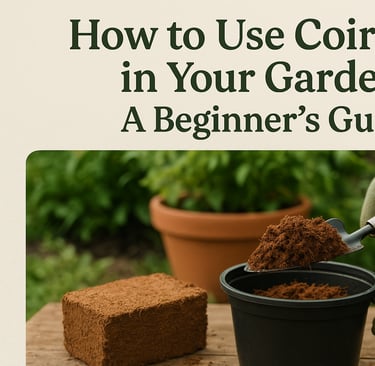How to Use Coir Peat in Your Garden: A Beginner’s Guide
Discover how to use coir peat in your garden for better soil, healthier roots, and sustainable growth. This beginner-friendly guide covers preparation, uses, and tips for thriving plants using coco peat.
7/13/20253 min read


Coir peat, commonly known as coco peat or coir pith, is quickly becoming a favorite among gardeners. It’s derived from the husk of coconuts and has proven to be an eco-friendly, sustainable, and highly efficient growing medium. If you’re new to gardening or looking for better alternatives to traditional soil, coir peat is an excellent place to start. In this guide, we’ll explore everything from what coir peat is, to how you can use it effectively in your garden.
Understanding Coir Peat
Coir peat is the spongy, fibrous residue left over after coir fiber is extracted from coconut husks. It’s typically light brown in color, fluffy in texture, and comes in compressed bricks, discs, or loose form. This byproduct, once discarded, is now being recognized for its excellent water retention, aeration, and neutral pH. It holds moisture up to eight times its weight, which helps reduce watering frequency and supports healthy root systems.
Why Choose Coir Peat?
Coir peat offers several advantages for gardeners. It retains moisture exceptionally well while also allowing air to flow through easily, preventing root rot and promoting healthy plant development. Its neutral pH level (typically 5.5 to 6.5) makes it suitable for a wide variety of plants. Additionally, it’s naturally free from weeds and pathogens, making it safe for delicate seedlings. Perhaps its greatest advantage is sustainability—coir peat is a renewable, biodegradable resource that reduces the dependence on peat moss or synthetic growing media.
Preparing Coir Peat for Gardening
Most coir peat products come in a compressed form and need to be hydrated before use. To prepare, place the block or brick in a large container or tub and add water—usually around 4 to 5 liters per 1 kg block. Within 20 to 30 minutes, the coir peat will expand and become loose and fluffy. Break it apart with your hands or a gardening tool to ensure there are no hard clumps. For sensitive plants, it’s advisable to rinse the expanded coir to remove any residual salts.
Using Coir Peat in Different Gardening Scenarios
There are several ways to use coir peat in your garden. It can be mixed with soil to improve its structure and moisture retention. For general use, a 1:1 mix with garden soil is a good start. Coir peat also works well as a standalone medium for seed starting due to its clean, pathogen-free nature. In container gardening, coir can be blended with compost or fertilizers to create a lightweight, well-drained potting mix. It also serves as a good mulch, helping retain moisture and suppress weeds around plants. For hydroponic gardening, coir peat is widely used because of its excellent water-holding ability and inert properties.
Practical Tips for Success
Although coir peat has many benefits, it’s important to supplement it with nutrients, as it lacks natural fertilization. You can mix it with compost, organic manure, or a balanced fertilizer for best results. Always store unused coir peat in a dry, cool area to prevent mold growth. After use, coir peat can be reused for another growing cycle or composted into the soil.
What Can You Grow with Coir Peat?
A wide variety of plants thrive in coir peat. Leafy greens like spinach and lettuce benefit from its consistent moisture, while herbs like mint and basil grow well in its aerated texture. Flowers such as marigolds and petunias also do well, as do fruiting plants like tomatoes, peppers, and cucumbers. Coir peat is also suitable for indoor plants and succulents when mixed with the appropriate materials.
Conclusion
For new and experienced gardeners alike, coir peat is a game-changing addition to the garden. It’s simple to use, improves soil conditions, conserves water, and supports eco-conscious growing. Whether you’re planting vegetables, herbs, or flowers, coir peat provides a solid foundation for healthy, thriving plants. Start incorporating coir peat today and watch your garden flourish with this natural, sustainable solution.
Fonir Global Pvt. Ltd.
QUICK LINKS
© 2025. All rights reserved.


OUR PRODUCTS
